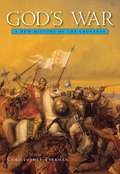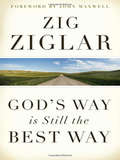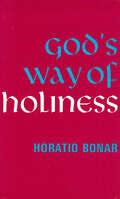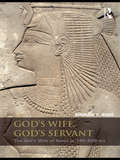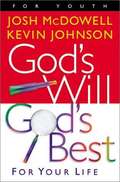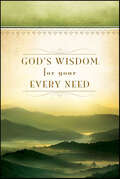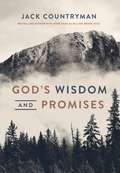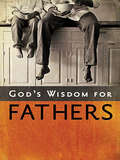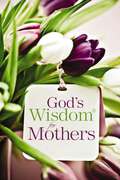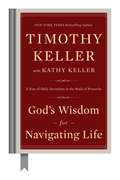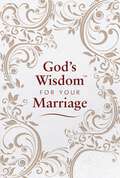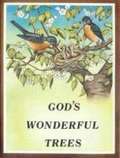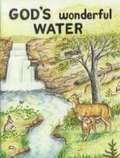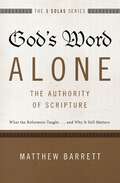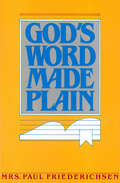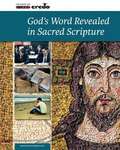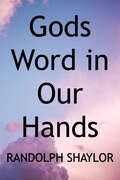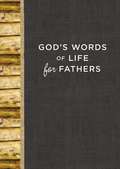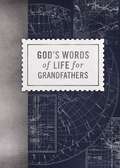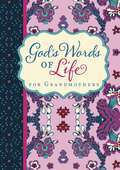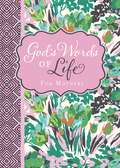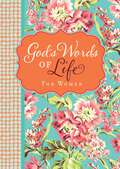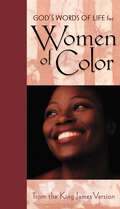- Table View
- List View
God's War: A New History of the Crusades
by Christopher TyermanGod's War offers a sweeping new vision of one of history's most astounding events: the Crusades. From 1096 to 1500, European Christians fought to recreate the Middle East, Muslim Spain, and the pagan Baltic in the image of their God. The Crusades are perhaps both the most familiar and most misunderstood phenomena of the medieval world, and here Christopher Tyerman seeks to recreate, from the ground up, the centuries of violence committed as an act of religious devotion. The result is a stunning reinterpretation of the Crusades, revealed as both bloody political acts and a manifestation of a growing Christian communal identity. Tyerman uncovers a system of belief bound by aggression, paranoia, and wishful thinking, and a culture founded on war as an expression of worship, social discipline, and Christian charity. This astonishing historical narrative is imbued with figures that have become legends--Saladin, Richard the Lionheart, Philip Augustus. But Tyerman also delves beyond these leaders to examine the thousands and thousands of Christian men-- from Knights Templars to mercenaries to peasants-- who, in the name of their Savior, abandoned their homes to conquer distant and alien lands, as well as the countless people who defended their soil and eventually turned these invaders back. With bold analysis, Tyerman explicates the contradictory mix of genuine piety, military ferocity, and plain greed that motivated generations of Crusaders. He also offers unique insight into the maturation of a militant Christianity that defined Europe's identity and that has forever influenced the cyclical antagonisms between the Christian and Muslim worlds. Drawing on all of the most recent scholarship, and told with great verve and authority, God's War is the definitive account of a fascinating and horrifying story that continues to haunt our contemporary world.
God's Way is Still the Best Way
by Zig ZiglarFor decades, Zig Ziglar has steered millions of people toward richer, more satisfying lives. Now, in God's Way Is Still the Best Way, this dynamic author and speaker teaches you biblical principles that will infuse your faith with action and skyrocket your impact on the world. Ziglar shares how developing the fruits of the Holy Spirit are key to an energized, God-centered life. Each chapter is filled with stories of men and women like Tony Evans, Mary Kay Ash, and Dr. Kenneth Cooper whose love forJesus propels them to share their faith and provide relief to a hurting world. A lively, Christ-centered book that teaches by example, God's Way Is Still the Best Way will inspire you to experience success God's way, which, as Ziglar says, is the only permanent way.
God's Way of Holiness (Colportage Library #152)
by Horatio Bonar"Follow peace with all men, and holiness, without which no man shall see the Lord." —Hebrews 12:14 (KJV)Holiness and peace with God depend on each other; peace allows holiness, holiness deepens peace. God's Way of Holiness will help you utilize powerful tools such as the Holy Spirit, the cross, and the freedom of the law in order to fight against sin and pursue holiness. Discover true life in Jesus Christ and the rewards of joy and peace!
God's Way of Holiness (Colportage Library #152)
by Horatio Bonar"Follow peace with all men, and holiness, without which no man shall see the Lord." —Hebrews 12:14 (KJV)Holiness and peace with God depend on each other; peace allows holiness, holiness deepens peace. God's Way of Holiness will help you utilize powerful tools such as the Holy Spirit, the cross, and the freedom of the law in order to fight against sin and pursue holiness. Discover true life in Jesus Christ and the rewards of joy and peace!
God's Wife, God's Servant: The God's Wife of Amun (ca.740–525 BC)
by Mariam F. AyadMariam F. Ayad explores how five women were elevated to a position of supreme religious authority. Drawing on a variety of textual, iconographic, and archaeological evidence, and containing fifty-one black and white and colour illustrations, the volume discusses this often neglected subject, placing the women within the broader context of the politically volatile, turbulent seventh and eighth centuries BCE.
God's Will, God's Best for Your Life
by Kevin Johnson Josh McDowellDo You Know the Real Secret to Happiness? Do You Know How to Fulfill the Desires of Your Heart? True happiness for you no doubt means things like loving and being loved surrounding yourself with good friends experiencing closeness to God finding a meaningful career enjoying the good things of life living a life that truly matters Those are the desires of just about every human heart. In God’s Will, God’s Best Josh McDowell and Kevin Johnson explain that God not only wants you to achieve those things, but He has a specific plan for you to experience each of them. God has made a promise to “give you the desires of your heart” (Psalm 37:4). You can discover how to receive that promise. There’s no catch—but there is a condition, a condition you can’t afford to miss. Begin your journey today in discovering God’s Will, God’s Best for your life. Your future happiness depends on it.
God's Wisdom For Your Every Need
by Jack CountrymanBiblical Wisdom for Everyday Living.God’s Wisdom for Your Every Need has been created for today’s culture. With the uncertainty of the economy and job insecurity, families are concerned about the future and need God’s wisdom more than ever. This insightful book is filled with 61 relevant topics for today, including wisdom for when you are faced with a crisis, when you need confidence, when life is unfair in the work place…and much more. These verses from God’s Word will bring encouragement, guidance, and hope no matter what the situation you’re facing in life.
God's Wisdom and Promises
by Jack CountrymanGod makes more than 7,000 promises in His Word, and He has proven faithful to keep every one of them. Find out what that means for you through bestselling author Jack Countryman’s newest book, God’s Wisdom and Promises, a manual for life that will point you to the Source of all true comfort and peace, no matter what your circumstances.If you want to experience all God has promised you for a closer walk with Him, God’s Wisdom and Promises is the perfect tool to help you in that journey. Readers have been looking to the God’s Promises brand for years to distill and understand the Scriptures. In God’s Wisdom and Promises, you will dive deeply into the grace, mercy, love, hope, and blessings God offers His people in His Word.Expertly divided into topics that are relevant to your everyday life, this book offers a guide for faith that will encourage and inspire you with the Word of God.Topics include:Praying EffectivelyUnderstanding God’s WillObeying GodHow to Let God Guide You in Your RelationshipsGod’s Promises for When You Feel Dissatisfied, Confused, Discouraged, Lonely, Depressed, Angry, Worried, or TemptedThe Love of God Is Your Eternal InheritanceAnd more!No matter how mature or new you may be to the faith, God’s Wisdom and Promises is filled with hope and blessings for all stages of life.Scripture is from the trusted New King James Version of the Bible.
God's Wisdom for Mothers
by Jack CountrymanThe crown of a mother is found in her faithfulness and character as it's reflected in her children. God's Wisdom for Mothers was created to give timeless wisdom and guidance for Scripture meditation and application with 11 categories (62 subjects) pertaining to motherhood. Topics include God's Wisdom with Children, God Delights in Mothers Who . . . , God Walks with Mothers Through Heartache, Adversity, Worry, and many, many more. Included are pages at the back for prayer lists and personal study notes. This book is a spiritual pathway to help every mother become all she can be in the eyes of God and her family. Note: Must be ordered in multiples of 24. Self-shipping box can be used as counter display. To order shrink-wrapped bundles without display box, use ISBN 978-1-4041-8993-5.
God's Wisdom for Mothers
by Jack CountrymanThe crown of a mother is found in her faithfulness and character as it’s reflected in her children. God’s Wisdom™ for Mothers was created to give timeless wisdom and guidance for Scripture meditation and application. It is divided topically to include 11 categories (62 subjects) pertaining to motherhood, such as Wisdom with Children, God Delights in Mothers Who . . . , God Walks with Mothers Through Heartache, Adversity, Worry, and many more. Included are pages at the back for prayer lists and personal study notes. This book is a spiritual pathway to help every mother become all she wants to be in the eyes of God and her family.
God's Wisdom for Navigating Life: A Year of Daily Devotions in the Book of Proverbs
by Timothy Keller Kathy KellerFrom pastor and New York Times bestselling author Timothy Keller comes a beautifully packaged, yearlong daily devotional based on the Book of Proverbs Proverbs is God’s book of wisdom, teaching us the essence and goal of a Christian life. In this 365-day devotional, Timothy Keller offers readers a fresh, inspiring lesson for every day of the year based on different passages within the Book of Proverbs. With his trademark knowledge, Keller unlocks the wisdom within the poetry of Proverbs and guides us toward a new understanding of what it means to live a moral life. God’s Wisdom for Navigating Life is a book that readers will be able to turn to every day, year after year, to cultivate a deeper, more fulfilling relationship with God. This makes a perfect companion to Keller’s devotional on the Psalms, The Songs of Jesus.
God's Wisdom for Your Marriage
by Jack CountrymanMake your marriage the best it can be by putting God at the center. Marriage is a beautiful blessing when husband and wife remain under God's umbrella of wisdom and guidance. He holds answers to every challenge, healing for every hurt, provision for every need, and is the source for every joy. God's Wisdom® for Your Marriage has been created to emphasize togetherness--not just with each other, but with Him--in all aspects of your relationship. Topics such as God's Plan, God's Guidance, God's Provision, and more, highlight the importance of caring and sharing together as an absolute way of life so your marriage will remain steadfast for a lifetime.
God's Wonderful Trees
by Mary M. Landis"God’s trees are a wonderful gift. They make the earth beautiful. What can a tree Do for me?"
God's Wonderful Water
by Mary Landis Virginia KreiderLeading little ones to love, worship, and trust God as they study the amazing ways that water supports life on earth.
God's Word Alone---The Authority of Scripture: What the Reformers Taught...and Why It Still Matters (The Five Solas Series)
by R. Albert Mohler Jr. Matthew BarrettHistorians and theologians alike have long recognized that at the heart of the sixteenth-century Protestant Reformation were five declarations (or “solas”) that distinguished the movement from other expressions of the Christian faith. Five hundred years later, we live in a different time with fresh challenges to our faith. Yet these rallying cries of the Reformation continue to speak to us, addressing a wide range of contemporary issues. The Five Solas series will help you understand the historical and biblical context of the five solas and how to live out the relevance of Reformation theology today. In God’s Word Alone—The Authority of Scripture, scholar and pastor Matthew Barrett looks at the historical and biblical roots of the doctrine that Scripture alone is the final and decisive authority for God’s people. He examines the development of this theme in the Reformation and traces the crisis that followed resulting in a shift away from the authority of Scripture. Barrett shows that we need to recover a robust doctrine of Scripture’s authority in the face of today’s challenges and why a solid doctrinal foundation built on God’s Word is the best hope for the future of the church.
God's Word Made Plain
by Mrs. Paul FriederichsenAn illustrated birds-eye view of major Bible teachings, with questions for study and discussion following each chapter.
God's Word Made Plain
by Mrs. Paul FriederichsenAn illustrated birds-eye view of major Bible teachings, with questions for study and discussion following each chapter.
God's Word Revealed in Sacred Scripture
by Micheal De Barra Joseph F. MccannThe book presents the revelation of Jesus Christ in scripture.
God's Word in our Hands
by Randolph Shaylor James B. WilliamsIn this follow-up book to the landmark From the Mind of God to the Mind of Man, the Text and Translation Committee discusses the historical preservation of the Word of God. The solid facts of the process by which the Bible has come to its present form are explained in detail. The book includes textual criticism of the existing manuscripts and autographs, including the Textus Receptus, the Majority, Eclectic, and Minority texts, and the Masoretic Text. It also provides needed answers to the arguments of those who adhere to extreme or exclusive positions. This book is excellent for pastors, teachers, and laypersons alike. It will prove that all conservative versions are, without a doubt, translations of the plenary verbally inspired Word of God.
God's Words of Life for Fathers (God's Words of Life)
by ZondervanDads can find the strength they need to love their family well with hundreds of verses specifically chosen to uplift them in all seasons of life. Biblical wisdom and insight from Scripture, in a handsome package, makes God’s Words of Life for Fathers a great choice for any dad.Whether as a gift for a new dad or a grandfather, God’s Words of Life for Fathers has the eternal truth of Scripture to help equip dads in the journey. Encourage the dads in your life with this book filled with biblical insights on timeless topics such as wisdom, prayer, faith, grace, and patience. With a handsome cover and two-color design throughout the book, God’s Words of Life for Fathers is the perfect gift for fathers of all ages and stages for Father’s Day, birthdays, baby gift, Christmas, and all gift-giving occasions.
God's Words of Life for Grandfathers (God's Words of Life)
by ZondervanRemind yourself of God's love and faithfulness with this handy book combining short readings with hundreds of scriptural promises. Whether you are new to grandparenting or a veteran, God's Words of Life for Grandfathers affirms the importance of your role in your grandchildren’s lives.This latest book in the God's Words of Life series covers more than 40 topics relevant to the joys and hopes of being a grandparent, such as family, prayer, wisdom, health, legacy, and God's love. With specially chosen Bible verses and rich devotional thoughts, God's Words of Life for Grandfathers will strengthen your heart and mind as you build a legacy for the next generation.
God's Words of Life for Grandmothers (God's Words of Life)
by ZondervanThis beautiful topically arranged devotional will encourage you whether you are a new grandma or have years of grandparenting experience. With hundreds of verses on topics such as hope, family, and God's faithfulness, God's Words of Life for Grandmothers reminds you of God's presence as you delight in loving your grandchildren well.With hundreds of Bible verses covering more than 40 topics important to grandparents such as family, prayer, wisdom, health, legacy, and God's love, this beautifully designed book with a flexcover and scalloped edges, the latest book in the bestselling God's Words of Life series, is arranged by topics relevant to the joys and hopes of being a grandparent. With specially chosen Bible verses and rich devotional thoughts, God's Words of Life for Grandmothers strengthens your heart and mind as you build a legacy for the next generation.
God's Words of Life for Mothers (God's Words of Life)
by ZondervanRegardless of what you find yourself facing as a mom, you can find peace and comfort in the eternal truths of Scripture. Encourage your heart and soul as you read through God’s Words of Life for Mothers, a beautiful book of curated verses to inspire you in every season. The cover features a beautiful fabric pattern from designer Amy Butler, and pages have unique scalloped edges.Whether you’re busy amid life with littles or advising your grown children through early adulthood, lean on God’s wisdom to love your family well. God’s Words of Life for Mothers includes hundreds of verses carefully organized by the topics you need most—grace, rest, wisdom, prayer, and many more. No matter what you need on any given day, find the inspiration you need straight from the Word of God.With a stylish cover and scalloped page edges, God’s Words of Life for Mothers is the perfect gift for any mom in your life!
God's Words of Life for Women (God's Words of Life)
by ZondervanWomen will love this topically arranged devotional for women that includes Scripture and timely devotional thoughts. With contributions from Joni Eareckson Tada, Ruth Bell Graham, Emilie Barnes, Rosa Parks, Elisabeth Elliot, and other godly women (gleaned from the NIV Women's Devotional Bible), God's Words of Life gives practical wisdom straight from the Bible. This beautiful book is perfect for personal use or to share with a friend.
God's Words of Life for Women of Color (God's Words of Life)
by Various AuthorsThe beauty of the African-American tradition is celebrated in God’s Words of Life for Women of Color. With enriching reflections from the Aspire: The New Women of Color Study Bible and uplifting and encouraging Scriptures, this topically arranged gift book will be a cherished gift to all who receive it. Each of the devotionals was written by well-known African-American men and women, in cooperation with the nineteen-million-member Congress of National Black Churches.
